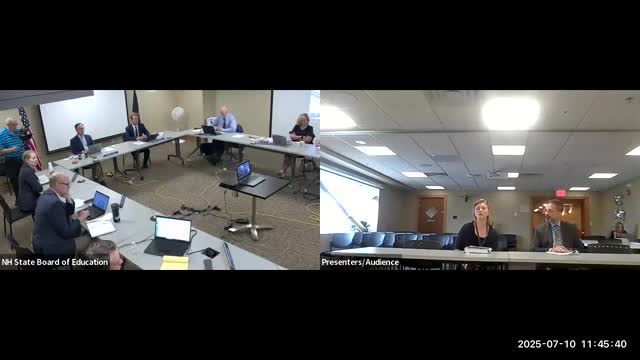Board Reviews Teacher Credentialing Requirements and Drops Master's Degree Mandate
July 26, 2025 | State Board of Education, State Government Agencies, Executive, New Hampshire
This article was created by AI summarizing key points discussed. AI makes mistakes, so for full details and context, please refer to the video of the full meeting. Please report any errors so we can fix them. Report an error »

The New Hampshire State Board of Education convened on July 10, 2025, to discuss several key educational initiatives, with a focus on curriculum development and teacher credentialing. The meeting highlighted the board's commitment to enhancing educational standards and addressing pressing issues such as substance abuse education.
One of the primary discussions centered around the integration of a comprehensive health curriculum that includes critical topics like alcohol and substance abuse. Board members expressed the need for a curriculum that not only meets educational standards but also equips students with the necessary tools to make informed decisions. The conversation emphasized the importance of teaching students about real-life scenarios and the consequences of their choices, particularly in social settings where substance use may occur. The board ultimately voted against accepting a specific health learning application, indicating a desire for a more robust and relevant curriculum.
In addition to health education, the board addressed the credentialing requirements for reading and writing specialists. A proposal was made to eliminate the mandatory master's degree requirement for these positions, arguing that practical teaching experience should take precedence over formal educational credentials. Board members discussed the potential barriers this requirement creates for qualified candidates who may possess the necessary skills and experience but lack a master's degree. The consensus leaned towards valuing teaching experience and subject matter expertise over advanced degrees, with a motion to approve the revised credentialing proposal.
The meeting also touched on the withdrawal of the Alton Dance Academy's application, which was noted as a procedural update rather than a significant agenda item.
Overall, the discussions at the meeting reflect the board's ongoing efforts to adapt educational standards to better serve students' needs and to ensure that teaching qualifications are aligned with practical experience. As the board moves forward, the implications of these decisions will likely resonate throughout New Hampshire's educational landscape, influencing both curriculum development and teacher recruitment strategies.
One of the primary discussions centered around the integration of a comprehensive health curriculum that includes critical topics like alcohol and substance abuse. Board members expressed the need for a curriculum that not only meets educational standards but also equips students with the necessary tools to make informed decisions. The conversation emphasized the importance of teaching students about real-life scenarios and the consequences of their choices, particularly in social settings where substance use may occur. The board ultimately voted against accepting a specific health learning application, indicating a desire for a more robust and relevant curriculum.
In addition to health education, the board addressed the credentialing requirements for reading and writing specialists. A proposal was made to eliminate the mandatory master's degree requirement for these positions, arguing that practical teaching experience should take precedence over formal educational credentials. Board members discussed the potential barriers this requirement creates for qualified candidates who may possess the necessary skills and experience but lack a master's degree. The consensus leaned towards valuing teaching experience and subject matter expertise over advanced degrees, with a motion to approve the revised credentialing proposal.
The meeting also touched on the withdrawal of the Alton Dance Academy's application, which was noted as a procedural update rather than a significant agenda item.
Overall, the discussions at the meeting reflect the board's ongoing efforts to adapt educational standards to better serve students' needs and to ensure that teaching qualifications are aligned with practical experience. As the board moves forward, the implications of these decisions will likely resonate throughout New Hampshire's educational landscape, influencing both curriculum development and teacher recruitment strategies.
View full meeting
This article is based on a recent meeting—watch the full video and explore the complete transcript for deeper insights into the discussion.
View full meeting
